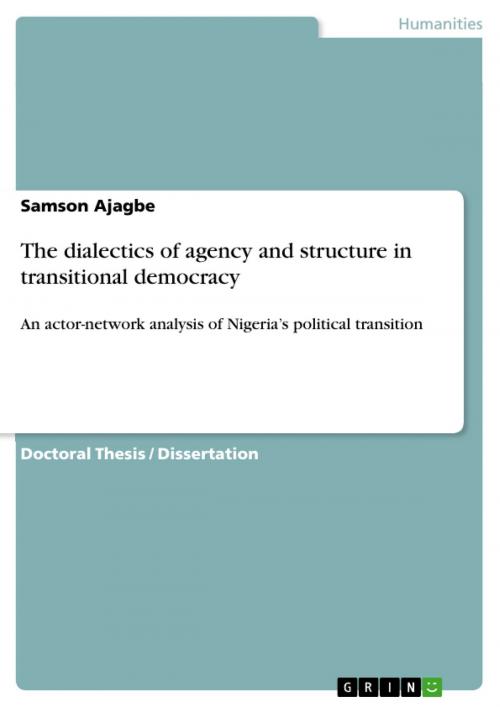The dialectics of agency and structure in transitional democracy
An actor-network analysis of Nigeria's political transition
Nonfiction, Social & Cultural Studies, Social Science, Sociology| Author: | Samson Ajagbe | ISBN: | 9783668022072 |
| Publisher: | GRIN Verlag | Publication: | July 27, 2015 |
| Imprint: | GRIN Verlag | Language: | English |
| Author: | Samson Ajagbe |
| ISBN: | 9783668022072 |
| Publisher: | GRIN Verlag |
| Publication: | July 27, 2015 |
| Imprint: | GRIN Verlag |
| Language: | English |
Doctoral Thesis / Dissertation from the year 2015 in the subject Sociology - Political Sociology, Majorities, Minorities, grade: 1,8, University of Freiburg (Institute of Sociology), course: Sociology, language: English, abstract: This thesis argues that we can no longer ignore elite's enrolment of institutions in rendering what they do intelligible as political outcomes in our understanding of African politics. The complex interdependency between elites and institution inheres into politics in ways political practices and actions are fabricated as permissible in the state of affair. This interaction is best understood through Actor-Network Theory (ANT) which essentializes hybridization in its conceptualization of the world. In this network thinking, transitional elites align and advance their interests through translating and enrolling institutions in the process of democratization. The analysis draws from Nigeria's democratization experience to bring together the institutional components of the state and leadership, i.e. elites, which have been mostly analyzed as separate entities in the study of democratization. The actor-network theory is used both as a conceptual frame and as a method for analyzing democratization as an outcome of the content of the two main societal forces- elite and institution. The actor-network theory's, developed by Michel Callon and Bruno Latour, and their collaborators, flat ontology provides a way to bypass agency/structure dichotomy to inscribe network thinking in relations of democratization in Africa. The actor-network was originally theorized by Focault but not nurtured and, therefore, muted in his governmentality study. In this view, this thesis builds on the explanatory potentials of network analysis that enable a socio-technical account of political transition with all those particularities, contradictions and surprising turn of events. The 'old-guard autocrats' in politics in Nigeria is used as the human element of the network. The non-human element is operationalized through the institutionalized power sharing norm and political patronage relationships. The analysis thus recognizes the interaction between the human (elites) and the non-human (institution) as actors that define adaptive and emergent characters of democratization.
Doctoral Thesis / Dissertation from the year 2015 in the subject Sociology - Political Sociology, Majorities, Minorities, grade: 1,8, University of Freiburg (Institute of Sociology), course: Sociology, language: English, abstract: This thesis argues that we can no longer ignore elite's enrolment of institutions in rendering what they do intelligible as political outcomes in our understanding of African politics. The complex interdependency between elites and institution inheres into politics in ways political practices and actions are fabricated as permissible in the state of affair. This interaction is best understood through Actor-Network Theory (ANT) which essentializes hybridization in its conceptualization of the world. In this network thinking, transitional elites align and advance their interests through translating and enrolling institutions in the process of democratization. The analysis draws from Nigeria's democratization experience to bring together the institutional components of the state and leadership, i.e. elites, which have been mostly analyzed as separate entities in the study of democratization. The actor-network theory is used both as a conceptual frame and as a method for analyzing democratization as an outcome of the content of the two main societal forces- elite and institution. The actor-network theory's, developed by Michel Callon and Bruno Latour, and their collaborators, flat ontology provides a way to bypass agency/structure dichotomy to inscribe network thinking in relations of democratization in Africa. The actor-network was originally theorized by Focault but not nurtured and, therefore, muted in his governmentality study. In this view, this thesis builds on the explanatory potentials of network analysis that enable a socio-technical account of political transition with all those particularities, contradictions and surprising turn of events. The 'old-guard autocrats' in politics in Nigeria is used as the human element of the network. The non-human element is operationalized through the institutionalized power sharing norm and political patronage relationships. The analysis thus recognizes the interaction between the human (elites) and the non-human (institution) as actors that define adaptive and emergent characters of democratization.















